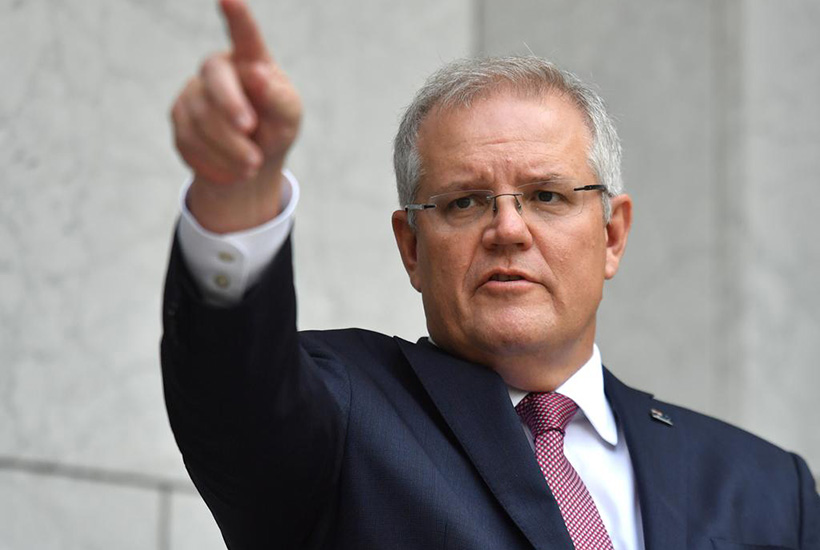Commercial tenants and landlords to get coronavirus answers by Tuesday

Commercial tenants and landlords can expect a decision on a mandatory code to guide them through the coming months by Tuesday, the Federal Government says.
On Saturday, MP Trent Zimmerman told ABC Radio confirmation of new rules was “very close” and would be finalised at the next National Cabinet meeting on Tuesday.
“The approach they’re adopting is for small and medium-sized businesses to institute through state legislation a mandatory code for those businesses and tenants that have been affected negatively by the coronavirus,” Mr Zimmerman said.
“That code will obviously lay out how landlords and tenants should be resolving the situation. But the clear principles are firstly that there can’t be evictions, secondly that landlords need to recognise the proportionate reduction in trade and revenue that their tenants are still receiving; thirdly, obviously we want a cooperative process.”
PM says decision pending
Despite much anticipation, Prime Minister Scott Morrison delivered little in the way of detail for tenants and landlords following a National Cabinet meeting on Friday. He did, however, say his Government was waiting for industry representatives to finalise a code of conduct for commercial tenancies.
“That industry code, the National Cabinet reviewed that today, has not got to the point that we believe it needs to get to, to ensure a sufficient security for (commercial) tenants and landlords that are affected by these arrangements,” he said.
In his statement, Morrison said commercial tenancies are “very important at this point.”
“What we are seeking to have happen is for the industry to complete their code, and that code would be made a mandatory code incorporating the state and territory legislation,” he said.
The Prime Minister added, the new legislation would see commercial tenancies with a turnover of less than $50 million that participate in the Jobkeeper program, subject to a mandatory code of practice regarding the negotiations and discussions between the landlord and the tenant.
“If you’re in that arrangement, which you would be required to enter into if you’re in the terms that I said, then you would have that protection of issues around evictions, you would have the protections around claims on penalties or acting on guarantees, of interest protection on rent, or all of these matters, you would be protected.”
“Also the landlord would be protected in that the lease would not be able to be terminated on those grounds, so there’s give and take in this, give and take.
“Those tenants and landlords are being encouraged to sit around that table and get that done now, the mandatory code would require it and if you sit outside the mandatory code then you are leaving yourselves out in the cold.”
The Prime Minister said, the code would incorporate a “proportionality principle” by which the turnover reduction of the tenant would need to be reflected in the rental waiver of the landlord, or for landlords and tenants to agree to a revised rental amount.
He also said that banks would need to be supportive of these tenants and landlords under the soon-to-be-announced mandatory code.
“We would expect banks to be very supportive of the agreements reached by landlords and tenants who would be working under this mandatory code,” said Morrison.
The Prime Minister said Cabinet hopes to consider the issue again on Tuesday at the latest.

Commercial tenants and landlords are waiting on a code in order to move forward.
Six-month ban on evictions
On 29 March, Scott Morrison announced that states and territories would be moving towards a moratorium on evictions for the next six months.
This has caused debate among tenants and landlords as there is still a lack of clarity around how this will be rolled out under each state and territory jurisdiction, and additionally, whether the Commonwealth would provide financial assistance to struggling renters.
Financial aid packages
There have been several packages announced for Australian businesses and households currently experiencing financial distress due to COVID-19.
These include the JobKeeper Allowance, which was the most recent package announced as part of the $130 billion stimulus package, the JobSeeker Allowance, a Coronavirus Supplement, and two one-off payments of $750.
Loan holidays for businesses and households
The Australian Banking Association has mandated that Australian banks defer the loan repayments of virus-hit small businesses for six months, to help them stay open and keep people in jobs. The package will apply to more than $100 billion of existing small business loans.
The measure will help keep people employed so they can continue paying their mortgages and rent.
The Big Four (NAB, CBA, Westpac and ANZ) have extended that lifeline to home loan customers in financial turmoil, enabling them to pause repayments for up to six months amid COVID-19. CBA will also cover the interest for that six-month period.
Energy providers help keep the lights on
Energy providers across NSW, VIC and SA have signed up to the relief package unveiled Thursday by Energy Networks Australia, to small and mid-tier businesses and households through COVID-19.
Small businesses that are mothballed as a result of the health pandemic will not need to pay gas or electricity charges from April until June if their consumption is less than a quarter than what it was in 2019.
The package also includes measures to help energy retailers provide further assistance to households during this time.
– with Adrian Ballantyne







